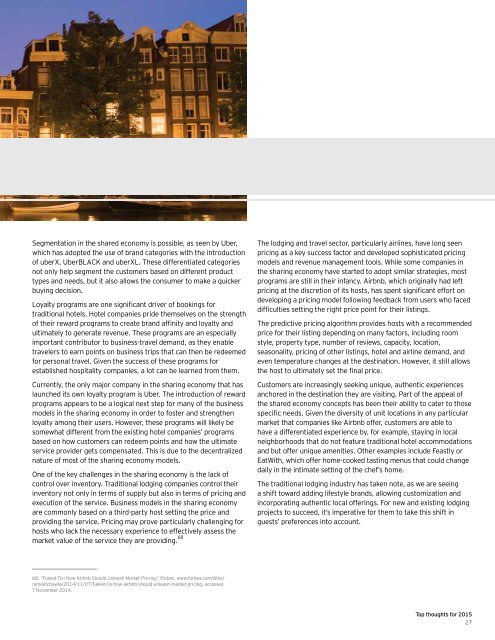ey-global-hospitality-insights-2015
ey-global-hospitality-insights-2015
ey-global-hospitality-insights-2015
You also want an ePaper? Increase the reach of your titles
YUMPU automatically turns print PDFs into web optimized ePapers that Google loves.
Segmentation in the shared economy is possible, as seen by Uber,which has adopted the use of brand categories with the introductionof uberX, UberBLACK and uberXL. These differentiated categoriesnot only help segment the customers based on different producttypes and needs, but it also allows the consumer to make a quickerbuying decision.Loyalty programs are one significant driver of bookings fortraditional hotels. Hotel companies pride themselves on the strengthof their reward programs to create brand affinity and loyalty andultimately to generate revenue. These programs are an especiallyimportant contributor to business-travel demand, as th<strong>ey</strong> enabletravelers to earn points on business trips that can then be redeemedfor personal travel. Given the success of these programs forestablished <strong>hospitality</strong> companies, a lot can be learned from them.Currently, the only major company in the sharing economy that haslaunched its own loyalty program is Uber. The introduction of rewardprograms appears to be a logical next step for many of the businessmodels in the sharing economy in order to foster and strengthenloyalty among their users. However, these programs will likely besomewhat different from the existing hotel companies’ programsbased on how customers can redeem points and how the ultimateservice provider gets compensated. This is due to the decentralizednature of most of the sharing economy models.One of the k<strong>ey</strong> challenges in the sharing economy is the lack ofcontrol over inventory. Traditional lodging companies control theirinventory not only in terms of supply but also in terms of pricing andexecution of the service. Business models in the sharing economyare commonly based on a third-party host setting the price andproviding the service. Pricing may prove particularly challenging forhosts who lack the necessary experience to effectively assess themarket value of the service th<strong>ey</strong> are providing. 68The lodging and travel sector, particularly airlines, have long seenpricing as a k<strong>ey</strong> success factor and developed sophisticated pricingmodels and revenue management tools. While some companies inthe sharing economy have started to adopt similar strategies, mostprograms are still in their infancy. Airbnb, which originally had leftpricing at the discretion of its hosts, has spent significant effort ondeveloping a pricing model following feedback from users who faceddifficulties setting the right price point for their listings.The predictive pricing algorithm provides hosts with a recommendedprice for their listing depending on many factors, including roomstyle, property type, number of reviews, capacity, location,seasonality, pricing of other listings, hotel and airline demand, andeven temperature changes at the destination. However, it still allowsthe host to ultimately set the final price.Customers are increasingly seeking unique, authentic experiencesanchored in the destination th<strong>ey</strong> are visiting. Part of the appeal ofthe shared economy concepts has been their ability to cater to thosespecific needs. Given the diversity of unit locations in any particularmarket that companies like Airbnb offer, customers are able tohave a differentiated experience by, for example, staying in localneighborhoods that do not feature traditional hotel accommodationsand but offer unique amenities. Other examples include Feastly orEatWith, which offer home-cooked tasting menus that could changedaily in the intimate setting of the chef’s home.The traditional lodging industry has taken note, as we are seeinga shift toward adding lifestyle brands, allowing customization andincorporating authentic local offerings. For new and existing lodgingprojects to succeed, it’s imperative for them to take this shift inguests’ preferences into account.68. “Fueled Fix: How Airbnb Should Unleash Market Pricing,” Forbes, www.forbes.com/sites/rameetchawla/2014/11/07/fueled-fix-how-airbnb-should-unleash-market-pricing, accessed7 November 2014.Top thoughts for <strong>2015</strong>27


